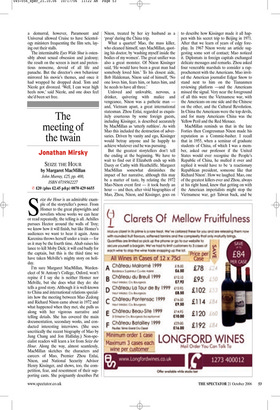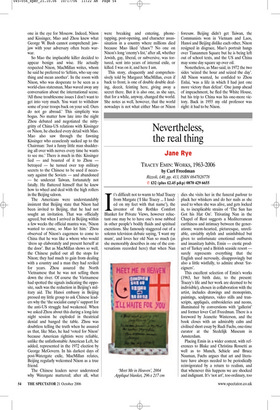The meeting of the twain
Jonathan Mirsky
SEIZE THE HOUR by Margaret MacMillan John Murray, £25, pp. 400, ISBN 0719562227 ✆ £20 (plus £2.45 p&p) 0870 429 6655 Seize the Hour is an admirable example of the storyteller’s power. From Homer to the great playwrights and novelists whose works we can hear or read repeatedly, the telling is all. Achilles pursues Hector around the walls of Troy; we know how it will finish, but like Homer’s audiences we want to hear it again. Anna Karenina throws herself under a train — for us it may be the fourth time. Ahab raises his lance to kill Moby Dick; it will end badly for the captain, but this is the third time we have taken Melville’s mighty story on holiday.
I’m sure Margaret MacMillan, Wardenelect of St Antony’s College, Oxford, won’t repine if I say she is neither Homer nor Melville, but she does what they do: she tells a good story. Although it is well-known to China and international relations specialists how the meeting between Mao Zedong and Richard Nixon came about in 1972 and what happened when they met, she pulls us along with her vigorous narrative and telling details. She has covered the main documentation, secondary works, and conducted interesting interviews. (She uses uncritically the recent biography of Mao by Jung Chang and Jon Halliday.) Non-specialist readers will learn a lot from Seize the Hour. Along the way, almost seamlessly, MacMillan sketches the characters and careers of Mao, Premier Zhou Enlai, Nixon, and National Security Advisor Henry Kissinger, and shows, too, the competition, fear, and resentment of their supporting casts. She poignantly describes Pat Nixon, treated by her icy husband as a ‘prop’ during the China trip.
What a quartet! Mao, the mass killer, who cleaned himself, says MacMillan, quoting his doctor, by ‘washing myself inside the bodies of my women’. The great unifier was also a great monster. Of Nixon Kissinger said, ‘He would have been a great man had somebody loved him.’ To his closest aide, Bob Haldeman, Nixon said of himself, ‘No one loves him, fears him, or hates him, and he needs to have all three.’ Unloved and unlovable, nervous, a drinker, quivering with malice and vengeance, Nixon was a pathetic man and, Vietnam apart, a great international statesman. Zhou Enlai, regarded as exquisitely courteous by some foreign guests, including Kissinger, is described accurately by MacMillan as ‘utterly ruthless’. As with Mao this included the destruction of adversaries. Driven by vanity and ego, Kissinger would betray anyone and lie happily to achieve whatever end he was pursuing.
But the greatest storytellers don’t tell the ending at the beginning. We have to wait to find out if Elizabeth ends up with Darcy or Cathy with Heathcliffe. Margaret MacMillan somewhat diminishes the impact of her narrative, although this may be a matter of taste, by relating the 1972 Mao-Nixon event first — it took barely an hour — and then, after vivid biographies of Mao, Zhou, Nixon, and Kissinger, goes on to describe how Kissinger made it all happen with his secret trip to Beijing in 1971. After that we learn of years of edgy foreplay. In 1967 Nixon wrote an article suggesting some sort of contact; Mao noticed it. Diplomats in foreign capitals exchanged delicate messages and remarks. Zhou asked four venerable marshals to consider a rapprochement with the Americans. Mao invited the American journalist Edgar Snow to stand next to him on the Tiananmen reviewing platform —and the Americans missed the signal. Very near the foreground of all this were the Vietnamese war, with the Americans on one side and the Chinese on the other, and the Cultural Revolution. In China the Americans were the top devils, and for many Americans China was the Yellow Peril and the Red Menace.
MacMillan reminds us that in the late Forties then Congressman Nixon made his reputation as a Commie-basher. I recall that in 1955, when a seminar of graduate students of China, of which I was a member, asked our professor if the United States would ever recognise the People’s Republic of China, he mulled it over and replied it would have to be ‘a reactionary Republican president, someone like that Richard Nixon’. How we laughed. Mao, one of the greatest killers ever and Zhou, always at his right hand, knew that getting on with the American imperialists might stop the Vietnamese war, get Taiwan back, and be one in the eye for Moscow. Indeed, Nixon and Kissinger, Mao and Zhou knew what George W. Bush cannot comprehend: jawjaw with your adversary often beats warwar.
So Mao the implacable killer decided to appear benign and wise. He actually respected Nixon, MacMillan writes, whom he said he preferred to ‘leftists, who say one thing and mean another’. In the room with Nixon, who was desperate to be seen as a world-class statesman, Mao waved away any conversation about the international scene. ‘All those troublesome issues I don’t want to get into very much. You want to withdraw some of your troops back on your soil. Ours do not go abroad.’ This simplicity was bogus. No matter how late into the night Zhou debated and negotiated the nittygritty of China-US relations with Kissinger or Nixon, he checked every detail with Mao. Mao also saw through the fawning Kissinger who ceaselessly sucked up to the Chairman: ‘Just a funny little man shuddering all over with nerves every time he wants to see me.’ There is much in this: Kissinger lied — and boasted of it to Zhou betrayed — he turned over top military secrets to the Chinese to be used if necessary against the Soviets — and abandoned — he undercut Taiwan, fortunately not fatally. He flattered himself that he knew how to wheel and deal with the high rollers in the Beijing saloon.
The Americans were understandably insistent that Beijing state that Nixon had been invited to Beijing, that he had not sought an invitation. That was officially agreed, but when I arrived in Beijing within a few weeks the official mantra was, ‘Nixon wanted to come, so Mao let him.’ Zhou observed of Nixon’s eagerness to come to China that he was like a whore who would ‘dress up elaborately and present herself at the door’. But as MacMillan shows so well, the Chinese pulled out all the stops for Nixon; they had much to gain from dealing with a country and a man they had reviled for years. Zhou assured the North Vietnamese that he was not selling them down the river. Of course the Vietnamese had spotted the signals indicating the opposite, such was the reduction in Beijing’s military aid. The Hanoi embassy in Beijing pressed my little group to ask Chinese leaders why the ‘the socialist camp’s’ support for the anti-US struggle had weakened. When we asked Zhou about this during a long-late night session he exploded in theatrical denial and banged the table. Zhou was doubtless telling the truth when he assured us that, like Mao, he had ‘voted for Nixon’ because American rightists were reliable, unlike the unfathomable American Left, he added, represented in the 1972 election by George McGovern. In his darkest days of post-Watergate exile, MacMillan relates, Beijing regularly welcomed Nixon as a true friend.
The Chinese leaders never understood why Watergate mattered; after all, what were breaking and entering, phonetapping, post-opening, and character assassination in a country where millions died because Mao liked ‘chaos’? No one on Nixon’s long ‘enemy’s list,’ after all, whether Jewish, gay, liberal, or subversive, was tortured, sent into years of internal exile, or killed. I was on it, and here I am.
This story, eloquently and comprehensively told by Margaret MacMillan, even if back to front, is one of double double dealing, deceit, feinting here, giving away a secret there. But it is also one, as she says, that for a while, anyway, changed the world. She notes as well, however, that the world nowadays is not what either Mao or Nixon foresaw. Beijing didn’t get Taiwan, the Communists won in Vietnam and Laos, Hanoi and Beijing dislike each other, Nixon resigned in disgrace, Mao’s portrait hangs over Tiananmen Square but he is being left out of school texts, and the US and China may some day square up over oil.
Nonetheless, as Mao said, in 1972 the two sides ‘seized the hour and seized the day’. All Nixon wanted, he confided to Zhou Enlai, ‘was a life in which I had just one more victory than defeat’. One jump ahead of impeachment, he fled the White House, but his trip to China was his one-more victory. Back in 1955 my old professor was right: it had to be Nixon.



































































































 Previous page
Previous page